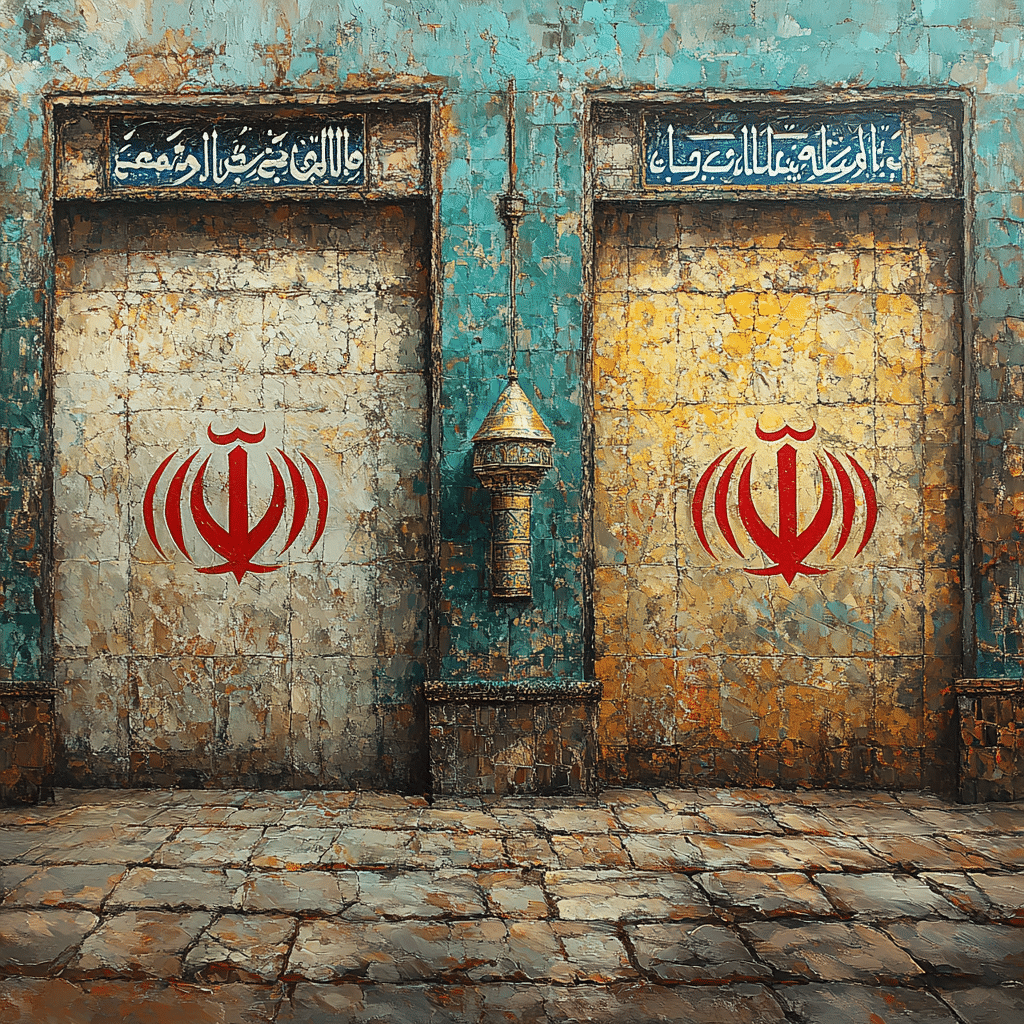When worlds collide in the realm of ideas, confusion often reigns. Nowhere is this more prevalent than in the intricacies of finance and investment where the term “conflating” frequently rears its head, leading to misunderstandings that can derail the best-laid financial plans. Sit tight as we tease apart the tangles that conflating has caused in various industries, offering insights sharp enough to rival Warren Buffett’s analytical acumen and strategic finesse à la Ray Dalio. Let’s embark on a journey of discovery that will shift mindsets from obfuscation to clarity.
Dismantling Confusion: Unveiling the True Nature of Conflating
A Definition Deep Dive: What Conflating Really Means
To kick off this expose with a bang, let’s dive deep into what we mean by “conflating.” At its core, conflation is the merging of two or more distinct entities, whether they be ideas, texts, or data sets, into a single entity, often erroneously. It’s like jamming two puzzle pieces together that look like they might fit but just don’t. In everyday parlance, it’s when we treat things as identical twins when they’re merely siblings.
Take the term “clean coal,” for example — a classic case where two separate technologies get lumped together under one misleading banner. It’s this kind of mishmash that can lead an investor astray faster than a rabbit down a burrow.
In the finance world, conflating things can be like mistaking a mirage for an oasis. For instance, blending the buzz around a new tech release with a sound investment opportunity, or confusing a charismatic CEO’s Twitter following for robust company culture. It’s these types of twists and turns that we’re here to unravel.

Conflating Market Trends with Investment Success
The Tech Industry’s Illusion of Unending Growth
Boy, oh boy, has the tech industry seen its ups and downs! Ponder the likes of Tesla, zooming to sky-high valuations, or WeWork, which went from a unicorn to nearly mythical for entirely different reasons. The boom and bust cycles in tech are nothing if not dramatic, and they serve as perfect exhibits of the dangers of conflating market hype with solid company fundamentals.
Hitching your investment wagon to a star that’s just a fleeting comet can lead to a crash landing in your portfolio. So when the next tech titan steps onto the stage, remember not to fall for the bright lights without peeking behind the curtain.
Misreading Housing Data: A Tale of Two Markets
Now, let’s mosey on over to real estate. It’s like observing a chess game between two grandmasters, with hot markets such as Austin making bold moves while once-flourishing areas like San Francisco recede. As real estate analysts warn, national figures can be as misleading as a funhouse mirror.
Listening to these sages, investors must discern the line between regional market conditions and broader economic health to prevent their financial strategies from going belly-up.
| Category | Details |
|---|---|
| Definition | The merging or fusing of two or more different elements into a single entity. |
| Common Usage | Often used to combine texts, ideas, opinions, or pieces of information. Can be incorrectly used to treat different concepts as the same. |
| Etymology | Originates from Latin “conflare” meaning “to blow together; to fuse,” indicating the blending of elements. |
| Modern Application | Can refer to the blending of technologies or bridging concepts that might be connected but are not inherently the same. |
| Example | “Clean coal” represents a conflation of carbon capture and storage technology with coal production to suggest environmentally friendly usage. |
| Misconception | Conflation is mistakenly used synonymously with equivalence, assuming two similar entities are identical without acknowledging their nuances. |
| Implications | Can lead to misunderstandings or the spread of misinformation by inaccurately representing the relationship between two distinct concepts. |
| In Literature | Employed to merge narratives or perspectives, sometimes to simplify complex arguments or to create new, comprehensive viewpoints. |
| In Media | Media often conflates issues to fit narratives or simplify stories, which can mislead the audience by obscuring important differences. |
Conflating Brand Buzz with Brand Health
The Social Media Mirage: Influencers vs. Sales
The social media scene is buzzing louder than a beehive on a summer day. Take Gymshark or Daniel Wellington, brands that have struck gold through influencer marketing. Yet, as any experienced investor knows, conflating likes and shares with dollars and cents can be a slippery slope.
It’s critical not to get caught up in the whirlwind and mistake a trendy post for a triumph in sales. Remember, real value is measured at the register, not just by the retweets.
Customer Engagement Misinterpreted
Let’s stir the Starbucks cup a bit and look beyond the froth. With a loyalty program more alluring than a double-shot espresso, one might jump to conclude that they’ve nailed customer loyalty to the wall. But halt and take a closer look at the sales data before leaping to such conclusions.
Metrics can lead you on a merry dance if you’re not careful. It’s about separating the wheat from the chaff and distinguishing between who’s merely passing by for a free Wi-Fi ride and who’s actually buying those venti lattes.

Conflating Leadership Styles with Company Culture
The Myth of the Charismatic CEO
Elon Musk – a name that’s become synonymous with innovation and market drama, often in equal measure. But let’s not be duped into equating a CEO’s charisma with an inherent healthy company culture. It takes more than a magnetic leader to create a nurturing work environment; it takes consistent and sincere effort across the board.
Charisma can dazzle and even inspire, but when it comes to understanding a company’s culture, it’s vital not to let star power blind us.
Employee Sentiment and Company Values Collision
Consider initiatives by companies like Patagonia, where company values aren’t just lip service but a living, breathing part of the organization. Here, there’s no conflating what’s espoused and what’s executed.
From offering environmental internships to advocating for social change, such companies are proof that you can walk the talk, and the distinction between saying and doing is crystal clear.
Conflating Economic Indicators with Economic Health
GDP Growth and the Wealth Gap
On paper, a country’s GDP might be bulking up like someone hitting the gym hard with a set Of Dumbbells, but delve a little deeper, and you might find the wealth distributed as unevenly as doughnuts at a weight watchers meeting.
High growth figures often mask the reality of the wealth gap, like a makeup tutorial that covers the blemishes. Nations like China exhibit robust GDP growth while grappling with societal issues that are no less significant.
Stock Market Highs as Prosperity Signals
The disconnect between soaring stock markets and the financial health of John and Jane Doe couldn’t be starker. It’s as though the markets are dancing to a different tune entirely, hardly missing a beat even as many citizens struggle to keep up with the post-pandemic recovery phase.
Just as the Titanic’s grandeur couldn’t save it from the iceberg, impressive index numbers are far from lifesavers for the majority’s economic well-being.
Conflating Educational Access with Educational Quality
Number of Graduates versus Market-ready Skills
Between the United States’ graduation rates and Finland’s renowned education system lies a chasm wider than the Grand Canyon. And it’s here where accessing education and the quality on offer often take divergent paths.
Educators the world over bemoan the mismatch – enough graduates to form an army, yet only a fraction battle-ready for today’s job arena. Bridging this gap is a mission critical to our economic future.
The Online Education Boom: Quantity Over Quality?
With the advent of online giants like Coursera and Udemy, there’s been an educational gold rush. But in this pursuit, are we conflating quantity with quality?
Scouring through employer feedback and research on educational outcomes is akin to sifting through ancient ruins – it takes effort to unearth the treasures of online education’s true worth in the marketplace.
Disentangling Myths from Realities: An In-Depth Sectoral Analysis
As we circle back to where we started, it’s time for a side-by-side appraisal. Each sector discussed is a cog in the great machine of our economy, and understanding the nuances is key to avoiding the trap of conflating.
Tech’s allure, housing data rabbit holes, the enigma of social media, the subtleties of corporate culture, economic indicator ambiguities, and the labyrinth of education—all these call for a keen and judicious eye.
Conclusion: Shifting from Conflation to Clarity
From the digital high streets to the boardroom, we’ve seen how conflating can distort reality. Our journey has shed light on widespread misconceptions and equipped us to distinguish facades from structures that truly endure. As you sieve through your next financial read, remember the adage: All that glitters is not gold.
So, with the analytical precision of a financial maestro, engage a clear-eyed perspective that transcends mere surface-level appeasements. For in the intricate dance between appearance and substance, clarity will always lead.
Unraveling the Chaos of Conflating
Well, folks, buckle up! We’re about to dive into the whirlwind world of conflating, and boy, does it get messy. You’ve probably heard the term thrown around, often misused as a fancy way to say “combining,” but it’s a slippery slope that leads to some eyebrow-raising misunderstandings! Let’s break down the mix-ups that have everyone talking.
When Black Friday Deals Aren’t Just About Deals
Ever heard someone say they’re headed to “ulta” for Black Friday and thought they meant they were going to the extreme? Well, hate to break it to you, but they’re probably talking about snagging stellar deals at the beauty giant, not going to some radical lengths. People often conflate the word “ulta” with “ultra,” but those in the know are aware they’re speeding over to Ulta, the store, to catch those doorbusters. And speaking of doorbusters, don’t forget to check out the jaw-dropping Ulta Black Friday sales!
The Art of Mistaken Identity
Now, how about we talk stars? Cch Pounder is an acclaimed actress, but mention her name, and you might see some puzzled looks followed by,Do you mean the fast food place? It’s a classic case of celebrity and brand conflation! CCH Pounder is a force to be reckoned with in the acting world, not a quick-stop for a burger and fries. What a mix-up, right?
A Solely Confused Conversation
Oh, and here’s a quirky one: Margot Robbie. Some folks have been overheard conflating her acting prowess with her… uh, feet. It’s bizarre, I know, but there’s a whole corner of the internet that’s got an odd fascination with celebrity tootsies. So much so, that a simple chat about Margot Robbie might trip into a discussion about her feet! Quite the quirky pivot, but if you’re curious about how feet become famous, there’s your answer at the tip of your toes, or should I say, the click of your mouse.
Sizing Up the Big Misunderstanding
Okay, let’s resize the conversation—literally. The hunt for minimalism has fashionistas everywhere singing praises for small Wallets For Women. Yet, here’s the kicker: Some folks conflate a desire for small wallets with a desire to skimp on spending. The truth is, it’s all about savvy shoppers loving the convenience and stylish statement—not pinching pennies! Small can indeed be mighty, both in style and function.
The Confusion in Your Grocery Aisle
Now, here’s a doozy. Some people, bless their hearts, confuse Mccaffreys with the McCafe you’d find in a certain golden-arched fast-food chain. No, my friend, McCaffreys is a whole different ballgame, serving up fresh groceries rather than coffee concoctions. Before your next shopping trip, remember that conflation could leave you looking for a latte in the produce section!
A Conflated Countdown
Gearing up for your favorite show’s next season can be thrilling, but imagine the shock when Invincible Season 2’s release date gets conflated with invincibility in general. Yeah, fans might be itching for the show’s comeback, but that doesn’t mean they’ve somehow gained superpowers themselves. So, while eagerly waiting, let’s keep grounded in reality—superhero dreams aside!
Lost in Linguistic Love
Lastly, let’s talk romance—a tricky beast on the best of days. Ever tried whispering sweet nothings in another language, only to realize you’ve conflated the words and possibly called your sweetheart a kitchen appliance? It’s a real danger with phrases like “my lover” in Spanish. Before whispering “mi amor,” get your translations straight, or you might find yourself in hotter water than intended!
Conflating can be a hilarious, confusing, and sometimes an educational mess of wires crossed and meanings jumbled. It’s a reminder to double-check our facts, our wallets, and yes, even our sweet nothings. Keep these tips in mind and you’ll be separating the mashed from the potatoes in no time!

What does it mean to conflate ideas?
When you’re talkin’ about conflating ideas, you’re essentially saying someone’s mashing two or more concepts together like potatoes at Thanksgiving, making them into a single dish when, in fact, they ought to be separate.
Does conflate mean confused?
Now, don’t get it twisted—’conflate’ doesn’t directly mean ‘confused.’ But hey, it’s easy to see why you might think that; conflating often leads to a mix-up, like putting your salt in the sugar jar.
What is another word for conflating?
Lookin’ for another way to say ‘conflating’? Well, you could use ‘blending,’ ‘merging,’ or ‘fusing.’ It’s like swapping out your usual jeans for chinos—they’re different but serve a similar purpose.
What is an example of conflating?
Here’s the deal: An example of conflating could be when someone says all insects are bugs. Whoa, buddy, hold your horses! Not all creepy crawlies with six legs are ‘true bugs’; that’s like saying all cars are Fords.
What is the difference between conflating and confusing?
Alright, let’s clear the air—conflating and confusing are cousins, but not twins. Conflating is about tossing different ideas into one pot, while confusing is when your thoughts are as tangled as last year’s Christmas lights.
What is an example of a conflation fallacy?
Oh, the conflation fallacy, a classic facepalm moment. Say you argue that folks who like action movies must love violence in real life. Yikes! That’s smushing two unrelated ideas together with no real connection, like trying to fit a square peg in a round hole.
Is conflate a negative word?
Conflate, a negative word? Well, it depends on context. It’s like wearing socks with sandals—it might work at a tech startup but could flop at a black-tie event. Use it with care.
What is the strongest word for confused?
If you’re so mixed up you’re walking circles in a parking lot trying to remember where you parked, ‘befuddled’ is the word that’s stronger than confused, like a triple shot espresso compared to your regular morning brew.
What is a fancy word for confused?
On the hunt for a fancy word for confused? Try ‘discombobulated.’ It’s a mouthful, like trying to say the alphabet backward at a spelling bee.
How do you use conflating?
“How you use ‘conflating’ in a convo,” you ask? It’s like when you argue that your friend’s love for hot yoga means they must adore summer heatwaves. Hold up, pal—that’s conflating two very different things.
What is the origin of conflating?
Roll back the timeline — ‘conflating’ comes from the Latin ‘conflāre,’ meaning to blow together. Picture ancient Romans, togas flapping, as they lump ideas faster than a Vespa scooting down a cobblestone street.
What is the word for two things that can’t coexist?
The term for two things that can’t coexist is ‘mutually exclusive.’ It’s like trying to listen to two songs at once—no matter how hard you try, your ears just won’t let you jam to both.
What is the opposite of conflating?
Wanna know the opposite of conflating? It’s ‘distinguishing’ or ‘separating.’ Think of it as pouring those M&Ms back out of the trail mix—each on its own turf again.
What does conflating mean in a sentence?
Drop ‘conflating’ into a sentence, and you got something like: “She’s conflating her dislike of broccoli with bad nutrition; just because it tastes like feet to her doesn’t mean it’s not healthy!”
Is conflate a new word?
Oh no, ‘conflate’ has been kicking around the English language since at least the 1600s. It’s not exactly fresh out of the oven, but it’s a timeless classic, like an old vinyl that still gets the party started.





















